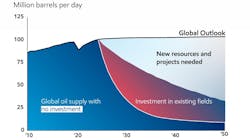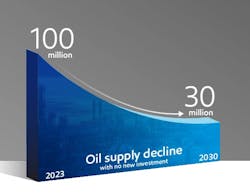ExxonMobil issues its 2024 global outlook report
By Bruce Beaubouef, Managing Editor
ExxonMobil has published its 2024 Global Outlook, a report that offers the company’s thoughts and projections on future energy demand, energy resources, and emissions reductions out to 2050.
The report notes that the number of people in the world is expected to increase from eight billion today to nearly 10 billion in 2050. With two billion more people on the planet, the report notes that the world will need new ways to produce more reliable, affordable energy; drive global economic growth to raise living standards, particularly in the developing world; and further reduce greenhouse gas emissions.
“The world will be different in 2050, but the need to provide the reliable, affordable energy that drives economic prosperity and better living standards, while reducing greenhouse gas emissions, will remain just as critical as it is today,” the report commented. “Achieving this balance will require wind, solar, oil and natural gas, as well as nearly every other form of available energy – because access to energy drives human development and quality of life.”
Using the United Nations created the Human Development Index from 2022, ExxonMobil determined that about four billion people currently live below the “modern energy minimum.” The report noted that is far below modern standards of living, which require reliable energy for housing, infrastructure, jobs, and mobility.
“By our analysis, for a country to rise above this threshold, the average energy use per capita would need to be at least 50 million British thermal units (MMBtu) per year,” the ExxonMobil report observed. “Developed countries around the world use, on average, more than three times that amount. Providing for the basic energy needs is a must to meet the UN’s goal to ‘end poverty in all its forms everywhere.’”
Lifting nations toward the modern energy minimum will drive a projected 15% increase in total energy use worldwide between now and 2050, says ExxonMobil. “Renewables will play an important role. So will oil and natural gas.” The report noted that such an increase will enable economic growth in developing countries. By contrast, energy use in developed nations is expected to decline by more than 10% as efficiency improves. “The world is at a pivotal stage: It needs to reduce carbon emissions and still provide the energy people need,” the report said.
Even as developing economies grow and consume more energy, global carbon emissions will start to fall for the first time by 2030, ExxonMobil predicts. “In fact, our outlook sees carbon emissions continuing to decline through 2050.” This will happen, the company says, through greater energy efficiency, more renewables, and lower-emission technologies, including carbon capture and storage, hydrogen, and biofuels.
As part of the world’s total energy mix, electricity use will grow by 80% by 2050, according to the report. More broadly, the most significant changes in the world’s total energy mix between now and then will be that solar and wind increase by greater than four times in the total energy mix. Coal will continue to be displaced by lower-emission sources, including natural gas, which reduces carbon emissions by up to 60% in electricity generation.
The report projects that oil and natural gas will continue to make up more than 50% of the world’s energy mix in 2050. Its analysis notes that if every new car sold in the world in 2035 were electric, oil demand in 2050 would still be 85 million barrels per day – the same number that it was in 2010.
The report further notes that the demand for oil to make gasoline for passenger cars will drop by 2050. But it adds that “what many don’t realize is that making gasoline is but one relatively small use for oil.” The large majority of the world’s oil is and will be used for industrial processes, such as manufacturing and chemical production, along with heavy-duty transportation like shipping, trucking, and aviation. “These services are needed for modern life – and they also fuel future economic growth in the developing world,” the report commented.
ExxonMobil also underscored the need for continued oil and gas investment. “Global oil and natural gas supplies [will] virtually disappear without continued investment,” the report observed. “As the world’s demand for oil and natural gas remains strong, sustaining investment is more important than ever.”
The outlook report noted that oil production naturally declines at a rate of about 15% per year. “That’s nearly double the IEA’s prior estimates of about 8%,” the report said. This increased decline rate is the result of the world’s shifting energy mix toward “unconventional” sources of oil and natural gas. “These are mostly shale and dense rock formations where oil and gas production typically declines faster,” the report said.
“To put it in concrete terms: With no new investment, global oil supplies would fall by more than 15 million barrels per day in the first year alone,” the report observed. “At that rate, by 2030, oil supplies would fall from 100 million barrels per day to less than 30 million – that’s 70 million barrels short of what’s needed to meet demand every day.”
In such a scenario, the report observed that “the world would experience severe energy shortages and disruption to daily lives within a year of investment ceasing.” Given price responses to past oil supply shocks, the permanent loss of 15% of oil supply per year could raise oil prices by more than 400%. By comparison, prices rose 200% during the oil price shocks of the 1970s. Within 10 years, unemployment rates would likely reach 30%. “That’s higher than during the Great Depression of the 1930s,” the report noted.
Any policy that would “‘keep it [oil and gas] in the ground’ is not just,” the report commented. “Sustained investment is needed to meet the world’s demand for oil and natural gas – even as companies like ExxonMobil invest billions to lower the greenhouse gas emissions associated with its own operations and help other industries lower theirs.”
The complete report can be found here.
About the Author
Bruce Beaubouef
Managing Editor
Bruce Beaubouef is Managing Editor for Offshore magazine. In that capacity, he plans and oversees content for the magazine; writes features on technologies and trends for the magazine; writes news updates for the website; creates and moderates topical webinars; and creates videos that focus on offshore oil and gas and renewable energies. Beaubouef has been in the oil and gas trade media for 25 years, starting out as Editor of Hart’s Pipeline Digest in 1998. From there, he went on to serve as Associate Editor for Pipe Line and Gas Industry for Gulf Publishing for four years before rejoining Hart Publications as Editor of PipeLine and Gas Technology in 2003. He joined Offshore magazine as Managing Editor in 2010, at that time owned by PennWell Corp. Beaubouef earned his Ph.D. at the University of Houston in 1997, and his dissertation was published in book form by Texas A&M University Press in September 2007 as The Strategic Petroleum Reserve: U.S. Energy Security and Oil Politics, 1975-2005.


